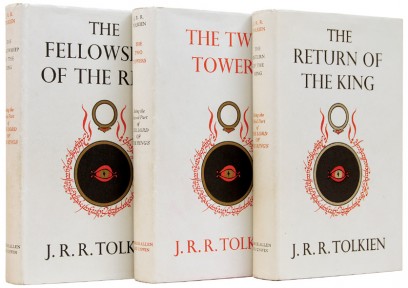April 11, 2014
Mapping the language we use to describe surveillance
by Julia Fleischaker

The Eye of Sauron, from Tolkien’s Lord of the Rings, is a better metaphor for American government surveillance than the more widely used Big Brother.
PEN America recently finished a 62 day Surveillance Metaphor Mapping Project, tracking the language that journalists use most often to describe government surveillance. They looked at 133 articles, by 105 different authors, in 60 news outlets and blogs and found a whopping 245 metaphors. Why study this use of language? PEN’s interactive page quotes Justice Benjamin Cardozo, “Metaphors in law are to be narrowly watched for starting as devices to liberate thought, they often end by enslaving it.” Writing about the study on The Millions, PEN’s Freedom to Write Fellow Deji Bryce Olukotun adds, “The inappropriate use of metaphors can distract from the fact that real lives are affected by them.”
According to Olukotun, “We found that 91 percent of the articles contained metaphors about surveillance. There is rich thematic diversity in the types of metaphors that are used, but there is also a failure of imagination in using literature to describe surveillance.” Journalists have used a variety of metaphors for the act of collecting data, but have shown far less imagination when it comes to literary metaphors.
PEN broke out the metaphors they found into seven broad themes; they’re below, along with some examples of how they’re most widely used:
- Collecting: words like sweep, harvest, and gather
- Literary: Orwell, Big Brother, dystopian
- Nautical: dragnet, trawling, tentacles
- Authoritarian: totalitarian, Stasi, Nazi Germany
- War: war on information, invade, blitz
- Medicine: hemorrhaging, implanting, infect
- Digging: mining, burrow, dig
Perhaps the most interest finding is how narrow the use of literary metaphors is; as Olukotun notes, 1984 was the only work of literature they found referenced in their study. Is that really the only appropriate metaphor, and how appropriate is it, actually? According to Olukotun, “scholars and activists have observed that relating U.S. government surveillance regimes to Big Brother overstates the case, because the U.S. is a more open society than the one 1984 describes and, despite the NSA’s overreach, the country should not be labeled authoritarian.” Journalists should stop using 1984 as shorthand for any government surveillance.
Olukotun points to Daniel J. Solove, who thinks that Kafka’s The Trial would be a better use of literary metaphor. Solove wrote, “We are not heading toward a world of Big Brother or one composed of Little Brothers, but toward a more mindless process — of bureaucratic indifference, arbitrary errors, and dehumanization — a world that is beginning to resemble Kafka’s vision in The Trial.”
Another appropriate reference would be the Eye of Sauron from Lord of the Rings. An article by David Rosen and Aaron Santesso on Slate argues that Tolkien’s creation, like government surveillance, is all-seeing but not all-knowing, and vulnerable to “dedicated subversives willing to sacrifice their lives.”
How to recognize the treacherous or psychopathic needle in the haystack? As recent months have proved, it’s not so easy. Our surveillance state, in contrast to Orwell’s, has had its share of failures. A dangerous assumption underlies many contemporary debates about government surveillance: the assumption of interpretive competence. Without diminishing the seriousness of the recent NSA revelations, Tolkien is finally more convincing about why total surveillance often fails than Orwell and his endless progeny are in imagining its inevitable success. That’s at once some small comfort and reason for concern.
Olukotun sums up the findings: “Our study suggests we need better metaphors while not losing sight of the implications of government action that affect real human beings.”
Julia Fleischaker is the director of marketing and publicity at Melville House.